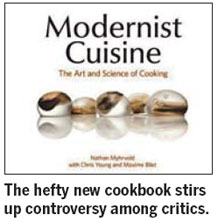Delicacies
What's all the fuss about the 4,000 yuan cookbook?
Updated: 2011-03-26 07:49
By Chris Michaud (China Daily)
A new widely anticipated six-volume cookbook with 1,500 recipes and a $625 (RMB4,100) price tag has won rave reviews but also a dose of skepticism.
Many food critics have praised Modernist Cuisine: The Art and Science of Cooking by Nathan Myhrvold, with its scientific principles and space-age gastronomic tools, as the most important culinary publication in history.
But others wondered whether the 18 kg, 2,400 plus tome needlessly complicates the fairly basic concept of cooking and eating.
In its review the New York Times said it "was left wondering how a book could be mind-crushingly boring, eye-bulgingly riveting, edifying, infuriating, frustrating, fascinating, all in the same moment".
Myhrvold, a multimillionaire and one-time technology officer for Microsoft, shrugs off the criticisms.
"Wine is not grape juice, and cheese is not cream," he says, referring to the history and tradition of cultivating and reformulating core ingredients into foods now deemed staples.

Myhrvold left Microsoft Research in 1999 to explore his lifelong interest in cooking and food science. He spent about five years working with co-authors Chris Young and Maxime Bilet, along with a team of 36 cooks, editors, photographers and technicians on the cookbook, which sold out its first printing before it could even be shipped.
Tim Zagat, co-founder of the Zagat guidebook empire, described Modernist Cuisine as "the most amazing cookbook I've ever seen in my life".
Lifestyle guru Martha Stewart agrees.
"Every recipe I've tried so far is just fantastic," she says, adding that she went out and bought a centrifuge, a necessary piece of equipment for some of the recipes.
"It was just an eye-opener," Stewart adds.
But an executive chef from one of Manhattan's most renowned restaurants says the style of cooking espoused in the book seems to move the diner away, in both time and usage, from the food and ingredients, instead of closer.
Alain Sailhac, executive vice-president and dean emeritus at The French Culinary Institute, is also skeptical of its approach.
"The less you manipulate the food, the better it is," he says.
But most agree that the book will help young chefs and aspiring home cooks understand the fundamentals and principles of cooking.
"It's possible to have quality ingredients and do nothing to them, but it's also possible to have quality ingredients and do something to them," Myhrvold says.
Ultimately the book is "for people who really love food and are curious about it", he adds.
And despite the book's high-tech approach Myhrvold has fulsome praise for a very non-tech item - the pressure cooker.
"We just love them," he says, adding it is "probably the most underrated thing in the conventional kitchen today".
Reuters
(China Daily 03/26/2011 page12)
Specials

Tea-ing up
More turning to Chinese tea for investment opportunities like vintage wine

A cut above
The ancient city of Luoyang is home to a treasure trove of cultural wonders.

Rise and shine
The Chinese solar energy industry is heating up following recent setbacks in the nuclear sector